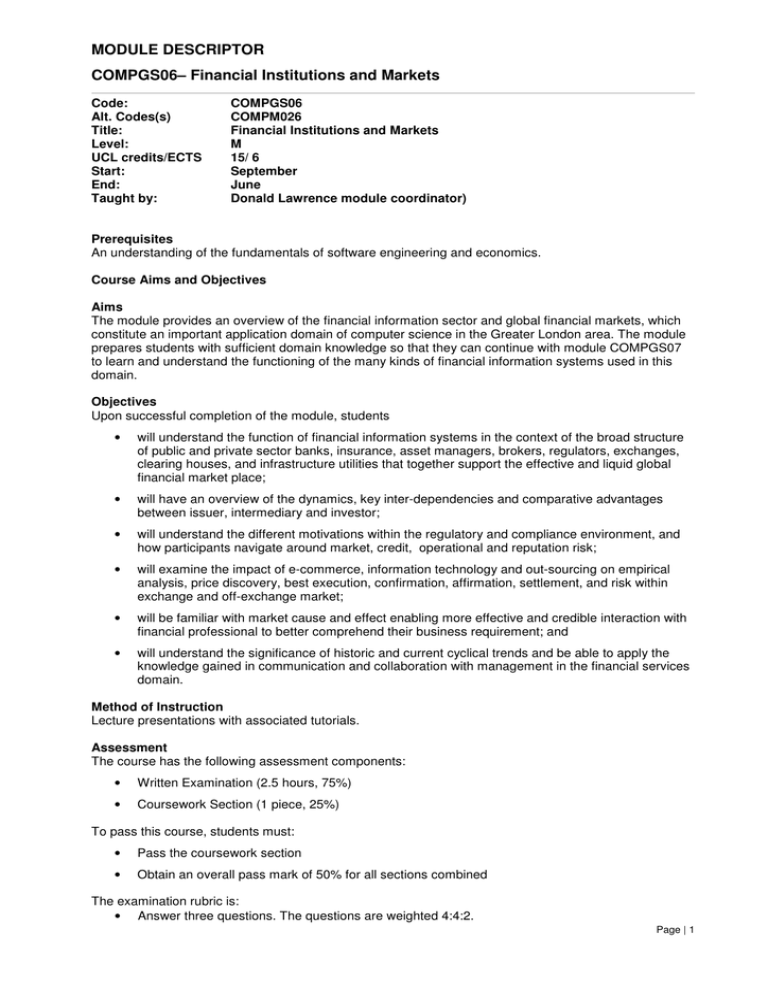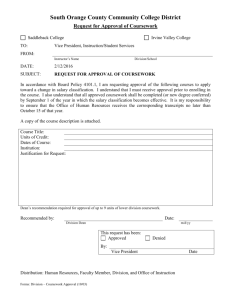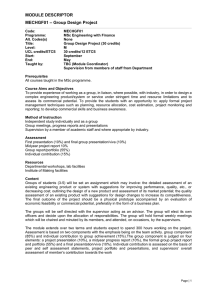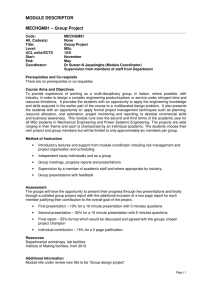MODULE DESCRIPTOR COMPGS06– Financial Institutions and Markets
advertisement

MODULE DESCRIPTOR COMPGS06– Financial Institutions and Markets Code: Alt. Codes(s) Title: Level: UCL credits/ECTS Start: End: Taught by: COMPGS06 COMPM026 Financial Institutions and Markets M 15/ 6 September June Donald Lawrence module coordinator) Prerequisites An understanding of the fundamentals of software engineering and economics. Course Aims and Objectives Aims The module provides an overview of the financial information sector and global financial markets, which constitute an important application domain of computer science in the Greater London area. The module prepares students with sufficient domain knowledge so that they can continue with module COMPGS07 to learn and understand the functioning of the many kinds of financial information systems used in this domain. Objectives Upon successful completion of the module, students • will understand the function of financial information systems in the context of the broad structure of public and private sector banks, insurance, asset managers, brokers, regulators, exchanges, clearing houses, and infrastructure utilities that together support the effective and liquid global financial market place; • will have an overview of the dynamics, key inter-dependencies and comparative advantages between issuer, intermediary and investor; • will understand the different motivations within the regulatory and compliance environment, and how participants navigate around market, credit, operational and reputation risk; • will examine the impact of e-commerce, information technology and out-sourcing on empirical analysis, price discovery, best execution, confirmation, affirmation, settlement, and risk within exchange and off-exchange market; • will be familiar with market cause and effect enabling more effective and credible interaction with financial professional to better comprehend their business requirement; and • will understand the significance of historic and current cyclical trends and be able to apply the knowledge gained in communication and collaboration with management in the financial services domain. Method of Instruction Lecture presentations with associated tutorials. Assessment The course has the following assessment components: • Written Examination (2.5 hours, 75%) • Coursework Section (1 piece, 25%) To pass this course, students must: • Pass the coursework section • Obtain an overall pass mark of 50% for all sections combined The examination rubric is: • Answer three questions. The questions are weighted 4:4:2. Page | 1 Resources: Saunders, ‘Financial Institutions Management’, 2003. Valdez, ‘Introduction to Global Financial Markets’, 2002. Roberts, ‘Wall Street’, 2002. Steiner, ‘Mastering Financial Calculations’, 1998. Content 1. Public and Private Sector Institutional Participants: 2. Overview of Consumer, Corporate and Investment Banking Financial Services: 3. The Factors Affecting Economic Cycles and Financial Institution Risk Adjusted Returns: 4. Time Value of Money, Discounting, Nominal and Effective Yield Measurement: 5. Capital Equilibrium between Issuer and Investor: 6. Capital Market Valuation and Measurement: 7. A Day in the Life of a Transaction: 8. Roles, Responsibilities and Controls of Deal Makers and Processing Staff: 9. Cash and Derivative Instruments, Transaction Services, and Advisory Page | 2 1 Learning Outcomes for COMPGS06 Financial Institutions and Markets General Learning Outcomes Ability to develop, monitor & update a plan, to reflect a changing operating environment N/A Ability to monitor and adjust a personal program of work on an on-going basis, and to learn independently Students are expected to manage their program of study, learn independently in order to produce a written coursework assignment to a given deadline. The ability to exercise initiative and personal responsibility, which may be as a team member or leader N/A The ability to learn new theories, concepts and methods etc and apply these in unfamiliar situations Normal learning situation common to all degree programs Specific Learning Outcomes Underpinning science & Mathematics A comprehensive understanding of the relevant scientific principles of the specialisation N/A. A critical awareness of current problems and/or new insights much of which is at, or informed by, the forefront of the specialisation. The students will understand the significance of current cyclical trends in the financial services domain. An understanding of concepts relevant to the discipline, some from outside engineering, and the ability to critically evaluate and apply them effectively. Students are expected to develop an understanding of various financial market concepts and learn how to apply them through coursework assignments. Engineering Analysis Ability to use fundamental knowledge to investigate new and emerging technologies N/A Ability to apply appropriate models for solving problems in engineering and the ability to assess the limitations of particular cases; N/A The ability to collect and analyse research data and use appropriate engineering tools to tackle unfamiliar problems, such as those with uncertain or incomplete data or specifications, by the appropriate innovation, use or adaptation of engineering analytical methods. N/A 1 EAB website http://www.engab.org.uk/documentation document Accreditation Of Masters Degrees Other Than MEng last accessed 10 Aril 2012 Page | 3 Design The ability to apply original thought to the development of practical solutions for products, systems, components or processes N/A Economic, Social and Environmental Context Knowledge and understanding of management and business practices, and their limitations, and how these may be applied appropriately, in the context of the particular specialisation The course provides the students with knowledge and understanding of the function of financial information systems and global financial markets and enables them to apply this knowledge to interact more effectively with financial professionals. The ability to make general evaluations of risks through some understanding of the basis of such risks N/A Engineering Practice A thorough understanding of current practice and its limitations, and some appreciation of likely new developments N/A Advanced level knowledge and understanding of a wide range of engineering materials and components N/A The ability to apply engineering techniques taking account of a range of commercial and industrial constraints N/A Page | 4



